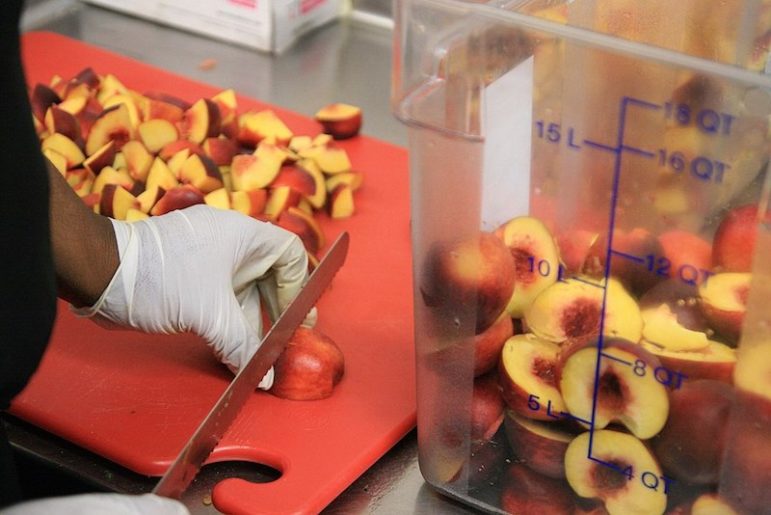
DC Central Kitchen
School food goes under the knife in Washington, D.C., in 2010.
A basic tenet of the American Dream is that all individuals have the opportunity for social and economic advancement. We believe that every American should be able to create a better future for oneself and one’s children depending on ability and effort. As Americans, we also recognize the important role that education plays in economic advancement by supporting a public education system. We even rightly support this system by providing free textbooks, lab equipment, and sports uniforms. This is done, regardless of family income, in the hopes that each student will achieve his/her full potential. But strangely, we fail to note the more fundamental, critical relationship between adequate nutrition and academic success. Indeed, to be properly schooled, students must be well-fueled. To be well read, they must be well-fed.
Yet, according to a new report from the U.S. Department of Agriculture, one in seven American children (11.1 million) live in homes that can’t reliably afford enough food, a condition delicately referred to by the government as “food insecurity.” In New York City, nearly one in five children (more than 324,000) suffer from food insecurity. And in the Bronx, New York’s hungriest borough, more than 37 percent of children live in food insecure households. But graceful terms to describe an inconceivably horrific condition are not what these hungry children need.
We are physicians and activists who care deeply about providing food to hungry American families. One of us is an activist who has devoted his career to providing direct services and resources to malnourished families. Two of us are physicians who provide healthcare to a diverse group of patients, including some of the most underserved. We all see the harmful impact and consequences of food deprivation on child health and the physical and psychological consequences of hunger on a family.
Children who go to bed hungry are more likely to suffer from expensive and preventable health conditions such as anemia, headaches, and stomach aches. Children who lack sufficient food are more likely to suffer from emotional conditions such as depression and anxiety, both with costly repercussions. Hungry children are more likely to experience learning difficulties, demonstrated by lower scores on achievement testing and the higher likelihood of having to repeat schooling. They are more likely to have disciplinary problems at school, which makes it likely they will later be caught up in the criminal justice system. In fact, hunger is linked to a host of downstream negative physical, emotional, and social effects. Knowing this, how does America allow one in seven of our children to struggle with hunger?
Instead of rhetorical coddling, hungry children need more food and the concrete support of their fellow Americans, starting with those in Congress. This is the only way to realistically mitigate the physical, emotional, and intellectual consequences of childhood food deprivation.Providing our children with nutritious food in a non-stigmatizing manner would be cheaper than paying for the medical and emotional consequences of childhood hunger which extend well into adult life
Legislation called the Child Nutrition Reauthorization (CNR), now pending in Congress, is the best, immediate mechanism to slash child hunger and dramatically boost the health of American children. As bad as child hunger is today, the recent USDA report did find that child hunger slightly decreased in 2018, likely the result of both stronger financial conditions for parents as well as the increased participation in the National School Breakfast Program. We must continue this trend.
This uptrend demonstrates that clear measures such as universal breakfasts and universal lunches can effectively decrease the number of hungry U.S. children. Currently, 30 million public school children participate in one of three forms of meal subsidies: free lunches, reduced priced, or so-called full-price lunches (which are actually subsidized too, just not as much as free lunches). Introducing a Universal Breakfast Program to all of these public school children would cost about 7 billion dollars per year, and expanding the existing National School Lunch Program to a UniversalLunch Program would add about another 6 billion dollars to our budget.
By ensuring that all public school children receive breakfast and lunch, the stigma felt by those children who participate in these programs can be reduced. One of us has felt the stigma personally while receiving reduced-priced lunch as a child, and we recognize the toll it can take on a young child’s psyche. Furthermore, the estimated one billion dollars required to administer the current system could be eliminated by making eligibility universal. Additionally, good child nutrition will save far more in the long-run in reduced spending on health care.New York City has begun moving in this direction with universal free lunches, but the economics for the City, and every locale, would be far better if the federal government picked up the full tab.
The Center for American Progress previously calculatedthat overall food insecurity costs the nation 167.5 billion dollars annually “due to the combination of lost economic productivity per year, more expensive public education because of the rising costs of poor education outcomes, avoidable health care costs, and the cost of charity to keep families fed.” While that study didn’t break-out the cost of child hunger, it is clearly in the tens of billions of dollars annually, well exceeding the 13 billion dollars that our proposed changes require.
Addressing child hunger with Universal School Breakfast and a Universal Lunch Program is cost effective and a logical choice. Congress has the opportunity to save American taxpayers a lot of money and also remedy an American immorality – millions of children going to bed hungry.
We acknowledge that these programs alone will not solve the problem of hunger in America; families will still need sufficient food on evenings, weekends, and during school breaks. And we must continue to support these families through more jobs, living wages, and the optimization of other federal nutrition programs like SNAP. Still, providing breakfast and lunch to every child on the school day will take a huge bite out of child hunger.
Marc S. Eisenberg, MD is an Associate Professor of Medicine at the Columbia University Medical Center and an Attending Physician at Columbia University Medical Center/New York-Presbyterian Hospital. He is co-author of the recent book: Am I Dying?!: A Complete Guide to Your Symptoms–and What to Do Next. Suja Mathew, MD, is Chair of Medicine at Cook County (Illinois) Health. Their affiliations are listed for identification purposes only. Joel Berg, a former official at the U.S. Department of Agriculture, is CEO of Hunger Free America, a nationwide advocacy and direct service organization.








